仁爱版七年级下册Unit 5 Our school life重点内容归纳与巩固练习(含答案)
文档属性
| 名称 | 仁爱版七年级下册Unit 5 Our school life重点内容归纳与巩固练习(含答案) |
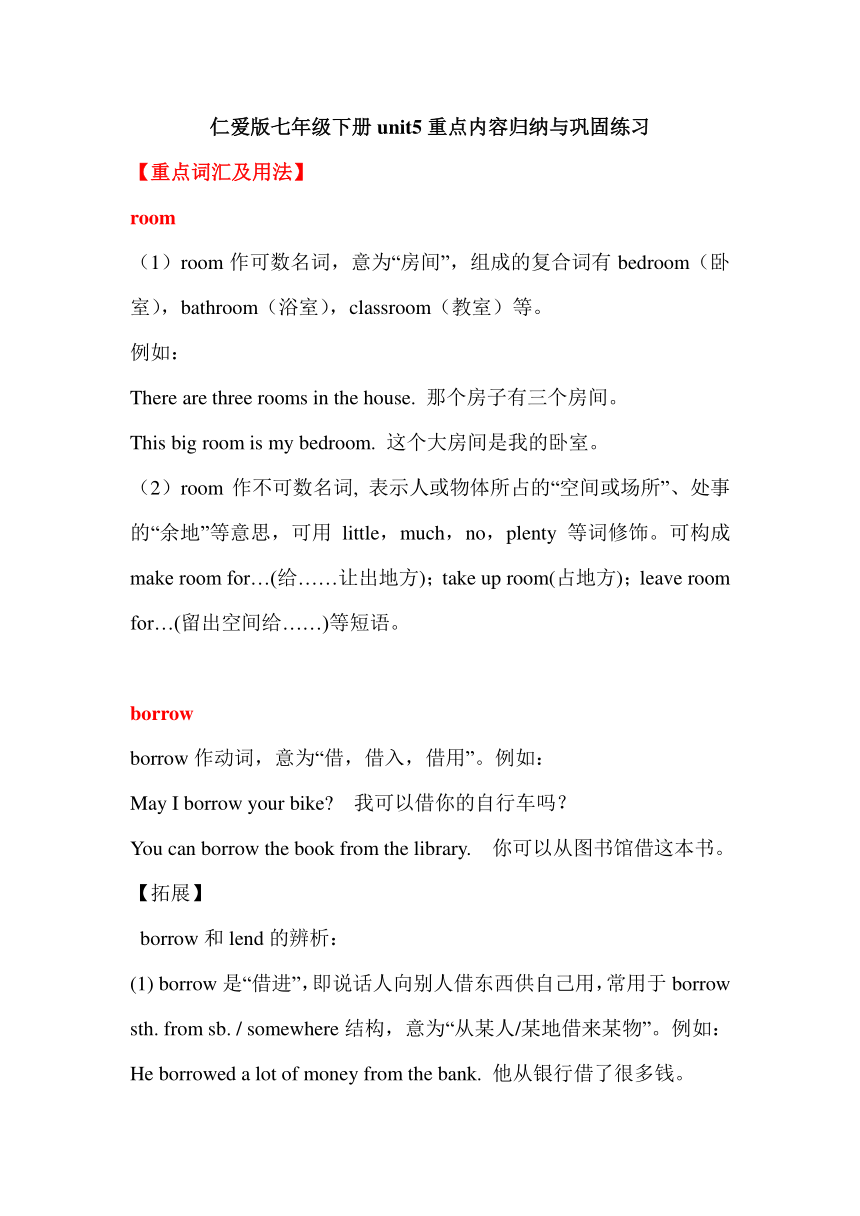
|
|
| 格式 | zip | ||
| 文件大小 | 83.0KB | ||
| 资源类型 | 教案 | ||
| 版本资源 | 仁爱科普版 | ||
| 科目 | 英语 | ||
| 更新时间 | 2020-04-29 00:00:00 | ||
图片预览

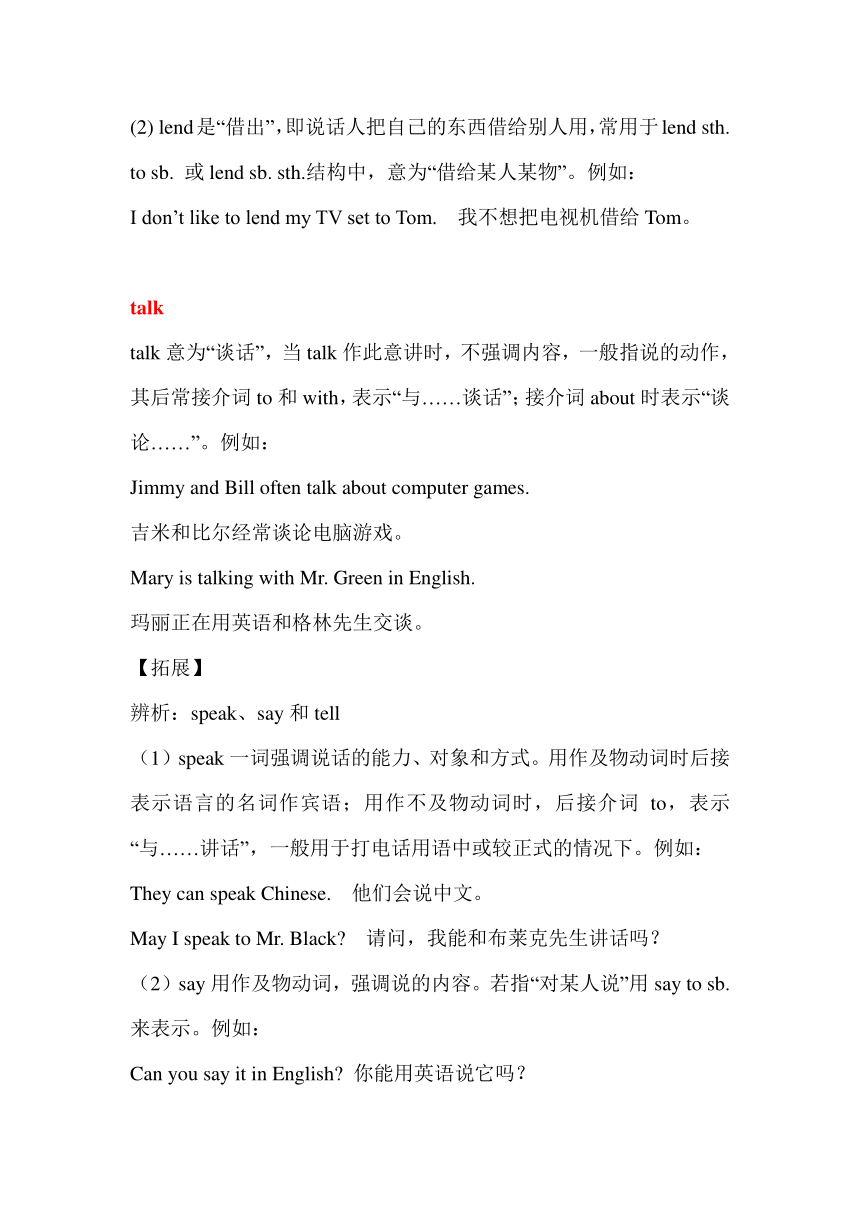
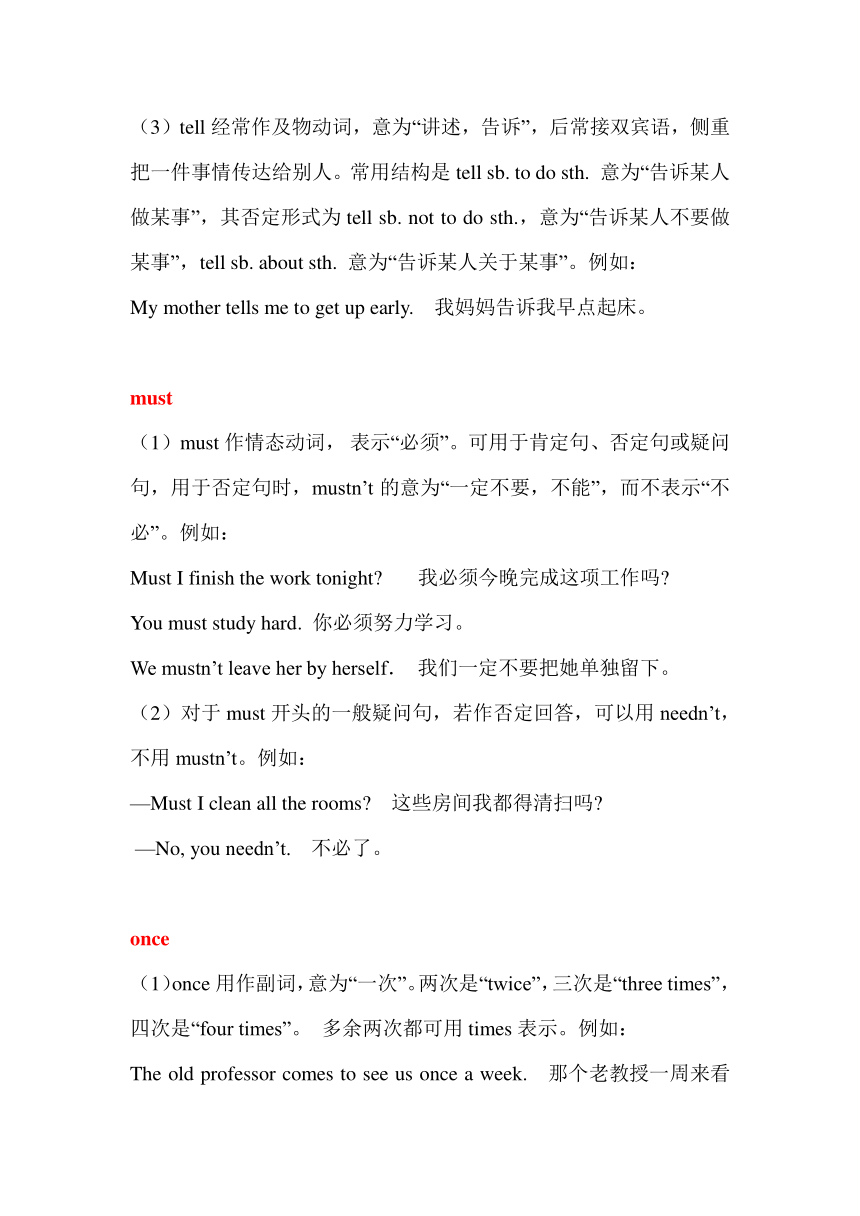
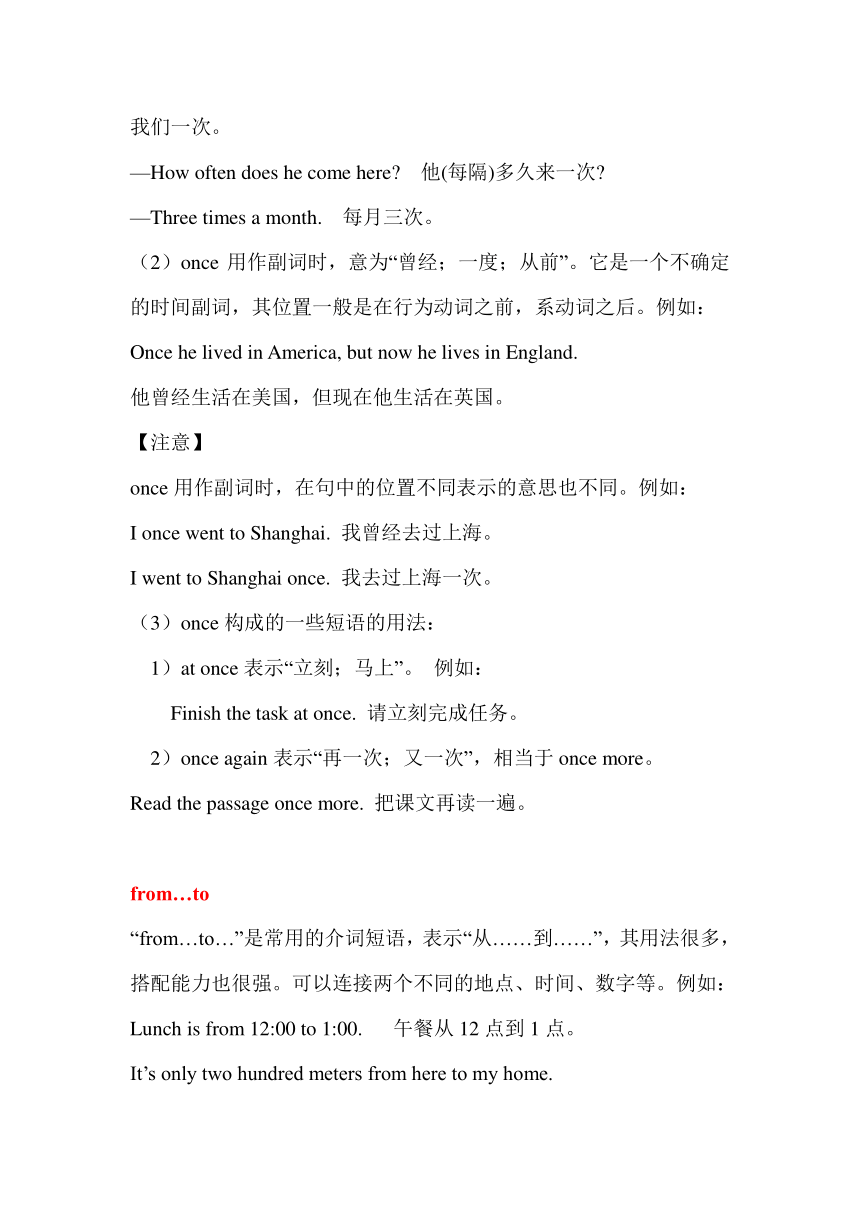
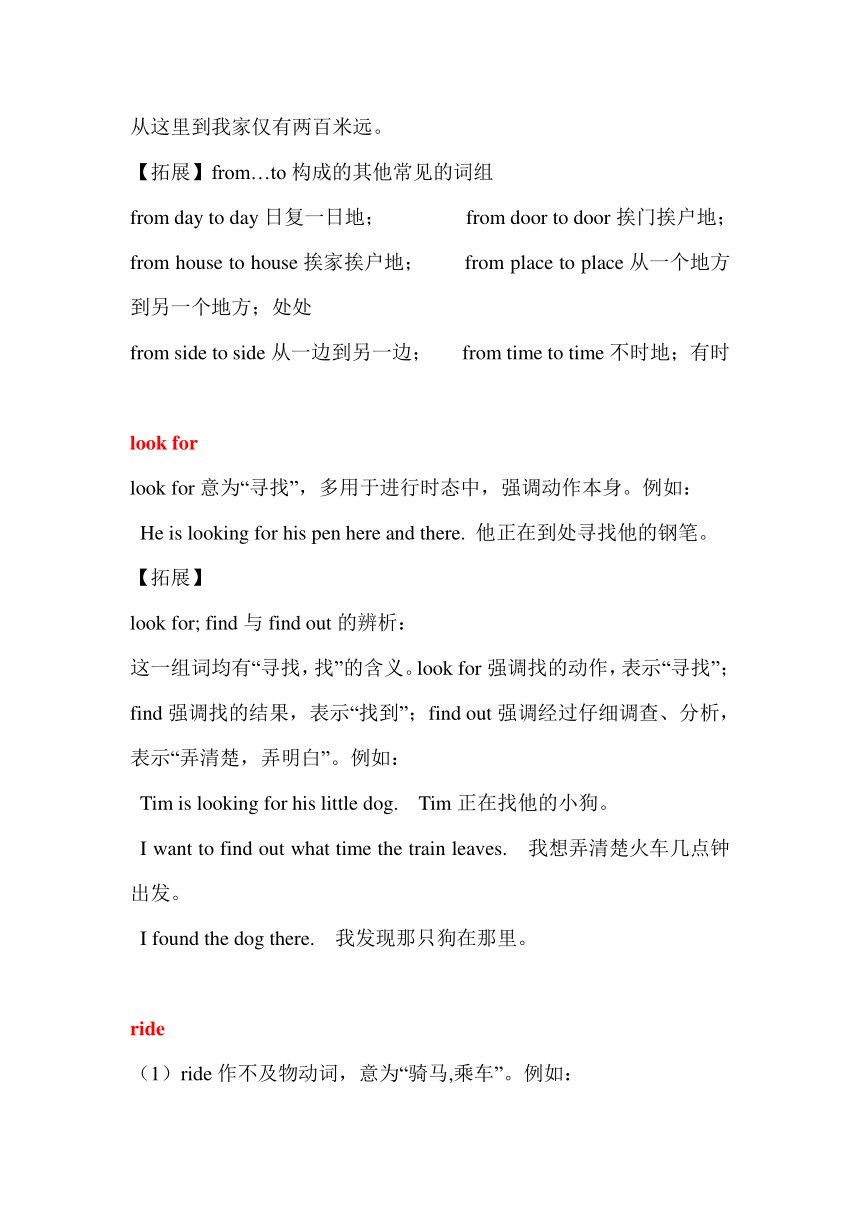
文档简介
仁爱版七年级下册unit5重点内容归纳与巩固练习
【重点词汇及用法】
room
(1)room作可数名词,意为“房间”,组成的复合词有bedroom(卧室),bathroom(浴室),classroom(教室)等。
例如:
There are three rooms in the house. 那个房子有三个房间。
This big room is my bedroom. 这个大房间是我的卧室。
(2)room作不可数名词, 表示人或物体所占的“空间或场所”、处事的“余地”等意思,可用little,much,no,plenty等词修饰。可构成make room for…(给……让出地方);take up room(占地方);leave room for…(留出空间给……)等短语。
borrow
borrow作动词,意为“借,借入,借用”。例如:
May I borrow your bike? 我可以借你的自行车吗?
You can borrow the book from the library. 你可以从图书馆借这本书。
【拓展】
borrow和lend的辨析:
(1) borrow是“借进”,即说话人向别人借东西供自己用,常用于borrow sth. from sb. / somewhere结构,意为“从某人/某地借来某物”。例如:
He borrowed a lot of money from the bank. 他从银行借了很多钱。
(2) lend是“借出”,即说话人把自己的东西借给别人用,常用于lend sth. to sb. 或lend sb. sth.结构中,意为“借给某人某物”。例如:
I don’t like to lend my TV set to Tom. 我不想把电视机借给Tom。
talk
talk意为“谈话”,当talk作此意讲时,不强调内容,一般指说的动作,其后常接介词to和with,表示“与……谈话”;接介词about时表示“谈论……”。例如:
Jimmy and Bill often talk about computer games.
吉米和比尔经常谈论电脑游戏。
Mary is talking with Mr. Green in English.
玛丽正在用英语和格林先生交谈。
【拓展】
辨析:speak、say和tell
(1)speak一词强调说话的能力、对象和方式。用作及物动词时后接表示语言的名词作宾语;用作不及物动词时,后接介词to,表示“与……讲话”,一般用于打电话用语中或较正式的情况下。例如:
They can speak Chinese. 他们会说中文。
May I speak to Mr. Black? 请问,我能和布莱克先生讲话吗?
(2)say用作及物动词,强调说的内容。若指“对某人说”用say to sb.来表示。例如:
Can you say it in English? 你能用英语说它吗?
(3)tell经常作及物动词,意为“讲述,告诉”,后常接双宾语,侧重把一件事情传达给别人。常用结构是tell sb. to do sth. 意为“告诉某人做某事”,其否定形式为tell sb. not to do sth.,意为“告诉某人不要做某事”,tell sb. about sth. 意为“告诉某人关于某事”。例如:
My mother tells me to get up early. 我妈妈告诉我早点起床。
must
(1)must作情态动词,?表示“必须”。可用于肯定句、否定句或疑问句,用于否定句时,mustn’t的意为“一定不要,不能”,而不表示“不必”。例如:???
Must?I?finish?the?work?tonight?? 我必须今晚完成这项工作吗???
You must study hard. 你必须努力学习。
We mustn’t leave her by herself. 我们一定不要把她单独留下。
(2)对于must开头的一般疑问句,若作否定回答,可以用needn’t,不用?mustn’t。例如:??
—Must?I?clean?all?the?rooms? 这些房间我都得清扫吗?
?—No,?you?needn’t. 不必了。
once
(1)once用作副词,意为“一次”。两次是“twice”,三次是“three times”,四次是“four times”。 多余两次都可用times表示。例如:
The old professor comes to see us once a week. 那个老教授一周来看我们一次。
—How often does he come here? 他(每隔)多久来一次?
—Three times a month. 每月三次。
(2)once用作副词时,意为“曾经;一度;从前”。它是一个不确定的时间副词,其位置一般是在行为动词之前,系动词之后。例如:
Once he lived in America, but now he lives in England.
他曾经生活在美国,但现在他生活在英国。
【注意】
once用作副词时,在句中的位置不同表示的意思也不同。例如:
I once went to Shanghai. 我曾经去过上海。
I went to Shanghai once. 我去过上海一次。
(3)once构成的一些短语的用法:
1)at once表示“立刻;马上”。 例如:
Finish the task at once. 请立刻完成任务。
2)once again表示“再一次;又一次”,相当于once more。
Read the passage once more. 把课文再读一遍。
from…to
“from…to…”是常用的介词短语,表示“从……到……”,其用法很多,搭配能力也很强。可以连接两个不同的地点、时间、数字等。例如:
Lunch is from 12:00 to 1:00. 午餐从12点到1点。
It’s only two hundred meters from here to my home.
从这里到我家仅有两百米远。
【拓展】from…to构成的其他常见的词组
from day to day日复一日地; from door to door挨门挨户地;
from house to house挨家挨户地; from place to place从一个地方到另一个地方;处处
from side to side从一边到另一边; from time to time不时地;有时
look for
look for意为“寻找”,多用于进行时态中,强调动作本身。例如:
He is looking for his pen here and there. 他正在到处寻找他的钢笔。
【拓展】
look for; find与find out的辨析:
这一组词均有“寻找,找”的含义。look for强调找的动作,表示“寻找”;find强调找的结果,表示“找到”;find out强调经过仔细调查、分析,表示“弄清楚,弄明白”。例如:
Tim is looking for his little dog. Tim正在找他的小狗。
I want to find out what time the train leaves. 我想弄清楚火车几点钟出发。
I found the dog there. 我发现那只狗在那里。
ride
(1)ride作不及物动词,意为“骑马,乘车”。例如:
She rode home on her bicycle. 她骑自行车回家。
The car rides smoothly. 这车乘起来很平稳。
(2)ride作及物动词,意为“骑(马等);乘(车)等”。例如:
He learned to ride a horse at the age of nine. 他九岁时学会了骑马。
I think more people should ride bikes. 我认为更多的人应该骑自行车。
(3)ride可作名词,意为“乘坐,骑马;(或乘车)旅行,兜风”等。例如:
He gave me a ride to the market. 他让我搭车去市场。
We went for a ride in the car. 我们开车兜风。
make
make作使役动词,后接省略to的动词不定式,即:make sb. do sth. 意为“使/让某人做某事”,类似的动词还有let,have等。例如:
The boss made them work for long time.
老板让他们长时间工作。
They made us forget the past. 他们使我们忘记了过去。
【拓展】
make作使役动词,意为“使……;让……”,常构成make + 宾语(sb./sth.) + 形容词/名词(作宾补),即make sb. / sth. + adj./n.。例如:
What he said makes us happy. 他所说的话使我们很高兴。
We made John our monitor. 我们选约翰当班长
always
always是频度副词,意为“一直,总是”。它的反义词是never, 意为“从不”。常用于一般现在时,其划线提问要用How often +一般疑问句。例如:
She always likes birthday cards. 她总是喜欢生日贺卡。
【拓展】
always, usually, often, sometimes和never是英语中最常见的频度副词。
(1)always的频度约为100%,表示动作重复、状态继续,中间没有间断,意为“总是、永远地”。例如:The sun always rises in the east and sets in the west. 太阳总是东升西落。
(2)usually的频度为约80%左右,意为“通常、平常”,即很少有例外。例如:
He usually goes to bed at ten o’clock. 他通常十点钟睡觉。
(3)often的频度为约60%左右,意为“常常”,但不如usually那么频繁,表示动作重复,中间有间断。例如:
He is often late for school. 他上学经常迟到。
(4)sometimes的频度约为40%左右,意为“有时”,表示动作偶尔发生。可以位于句首,以示强调。例如:
It is sometimes hot and sometimes cold. 天气忽冷忽热。
Sometimes he does it this way and sometimes he does it that way.
他有时这样做,有时那样做。
(5)seldom的频度约为20%左右,意为“很少、不经常”。 例如:
I hardly ever go out these days. 这些天我几乎不出门。
(6)never 的频度为0,意为“从来不、永不”。 例如:
My parents are never late for work. 我父母上班从来不迟到。
listen
listen是不及物动词,常与to连用,意为“听……”。例如:
Listen carefully! 认真听!
Don’t listen to him. 不要听他的话。
I like listening to music. 我喜欢听音乐。
【拓展】
sound、hear和listen的辨析:
sound是连系动词,后接形容词,表示“听起来”;hear是及物动词,后接听到的内容;listen是不及物动词,表示听的动作,后面接听的对象时,要加上to。例如:
The song sounds wonderful! 那首歌听起来太精彩了!
He listened carefully, but he heard nothing. 他仔细听,可什么也没听到。
He is listening to the teacher. 他正在听老师讲课。
a few
few为形容词,意为“不多,很少”,只能与可数名词搭配,表示“几乎没有”,自身有否定含义。也常与不定冠词a组成词组a few,表示“有一点”,有肯定含义。例如:
He has few friends. 他几乎没朋友。
May I ask a few questions? 我可以问几个问题吗?
【拓展】
辨析:few/a few; little/a little
(1)few/a few只能用来修饰可数名词,few表示否定,意为“没有,几乎没有”;a few表示肯定,意为“有几个,有一些”。例如:
He has few friends here, he feels lonely.
他这里没朋友,他感觉寂寞。
There are a few eggs in the basket. 篮子里有几个鸡蛋。
(2)little/a little只能用来修饰不可数名词,little表示否定,意为“没有,几乎没有”;a little 表示肯定,意为“有一点,有一些”。例如:
There is little ink in my bottle, can you give me a little ink?
我的瓶子里没有墨水了,你能给我点儿墨水吗?
American
American作名词时,意为“美国人,美洲人”;做形容词时,意为“美国的,美国人的,美洲的”。America意为“美国”,和American都是专有名词,第一个字母要大写。例如:
He is an American student. 他是个美国学生。
He comes from America. 他来自美国。
【拓展】
其它常见的国家和某国人的表达。
国家 居民 语言
China中国 Chinese 中国人 Chinese汉语
America美国 American美国人 English英语
England英国 Englishman英国人 English英语
Japan日本 Japanese日本人 Japanese日语
【重点句型句式】
How often do you come to the library?
how often 指每隔多久,主要用来对频度副词或表示次数的状语(如:sometimes,usually,once a week, three times a month 等)提问。例如:
—How often does he come here? 他(每隔)多久来一次?
—Three times a month. 每月三次。
—How often do you visit your mother? 你多长时间看你妈妈一次?
—Once a week. 一周一次。
【拓展】
how和many, much, long,old, often等词连用,询问数量、长度、年龄、频率等。
例如:
How old are you? 你多大了?
How many students are there in your school? 你校有多少学生?
How much milk is there in the bottle? 瓶子里有多少牛奶?
Oh, It’s time for class.
It’s time for后接名词或动词-ing形式,意为“该到做某事的时间了”; It’s time to+动词原形,也表示“该到做某事的时间了”。例如:
It is time to leave. = It is time for leaving. 该是离开的时候了。
It’s time for school. 该上学了。
【注意】
It’s time to…中间也可以加上for sb., 表示“该到某人做某事的时间了”。
例如:
It is time for us to go to bed. 该是我们睡觉的时候了。
What do you think of it?
(1) What do/does sb. think of…? 这是询问某人对某事(人)的看法常用的句型,意为“……认为……怎么样?”,答语往往是对某物(人)的评价。
例如:
—What do you think of the book written by him?
你认为他写的那本书怎么样?
—It is very good. 很好。
(2) What do you think of…?可以和How do you like…?互换。
例如:
What do you think of the film? = How do you like the film?
你认为这部电影怎么样?
What about yours?
(1)“What about…= How about…”意为“……怎么样”,用来征求别人的意见,了解情况或提出建议。其后可以接名词或者是代词,接代词时要用宾格。例如:
What about the book? 那本书怎么样?
I like this car, what about you? 我喜欢这辆汽车,你呢?
(2)What about后接动词时,一定要用动词的-ing形式,例如:
What about going shopping? 去购物怎么样?
What about drinking a cup of tea? 喝杯茶怎么样?
I think it’s a little difficult and boring.
(1)… think后所加的从句,是宾语从句,句意为“……认为……”。例如:
I think he is a good boy. 我认为他是一个好孩子。
(2)当think后接的宾语从句为含有not的否定句时,该否定应移至主句,即否定主句的谓语动词。例如:
I don’t think it will rain tomorrow. 我认为明天不会下雨。
I don’t think you are right. 我认为你不对。
【拓展】
I think so.用于肯定对方提出的观点或看法,“我认为是这样的”,其中so是代词,代替前面所说的话或句子。例如:
— Do you think it will rain? 你认为会下雨吗?
— Yes, I think so. 是的,我认为是。
My school life is very interesting.
interesting是形容词,意为“有趣的”,作定语和表语。例如:
The book is very interesting. 这本书很有趣.(表语)
The story sounds interesting. 这个故事听起来很有趣.(表语)
That is an interesting film. 那是一部有趣的电影.(定语)
【拓展】
be interested in sth/doing sth. 表示“对某事感兴趣”,interested是形容词,意为“感到有趣的”。
例如:
I am interested in English. 我对英语感兴趣.
He is interested in playing football. 他对踢足球感兴趣.
【重点词汇专练】
1. The students go to school _____(介词)the morning.
2. We don’t have lessons _______(介词)Saturday or Sunday.
3. I often go home _____(介词)five in the afternoon.
4. He is looking _____介词the red pencil.
5. My friends have classes_____ Monday _____(介词)Friday.
6.—Which s_______ do you like best?—English.
7. There are a f______ students in the classroom, and I find Tom.
8. I often b_______ books from the library.
9. It is i_______ to fly kites in spring.
10.Xiao Hong is the best student in her class. She always works h_____.
11.I like maths, b_______it’s interesting.
12.What’s your favourite s_________?
13. We often play football a________ school.
14. What time is the class o______?
15. I think it’s a little difficult and b_______.
16. He h_______ four lessons in the morning.
17. They usually have a big d_______ on weekends.
18. My father often s__________ work at nine in the morning.
19. In the afternoon, we have a b________in the playground.
20. I like reading i________stories.
21. What d_____ is it today?
22.—Why do you like W________ best?
—Because I have a music class.
23. What class are they h_______?
参考答案:
1. in 2.on 3.at 4.at/for 5. from, to
6. subject 7. few 8.borrow 9.interesting 10. hard
11. because 12.subject 13.after 14. over 15.boring
16. has 17. dinner 18. starts work 19.break 20.interesting
21. day 22. Wednesday 23. having
【重点句型专练】
1. Mary does her homework in the evening . (改为一般疑问句)
________ Mary ________ her homework in the evening?
2.他正在长城上拍照片。
He’s _______ ________on the Great Wall.
3.我们能互相帮助。
We can help_______ _______.
4. 他每周上多少课?
How many lessons ______ he _______every week?
5.她能用英语和老师谈话。
She can _______ ______ her teacher in English.
6. she,the blackboard,at the back of,the classroom,is,cleaning.(连词成句)
__________________________________________________.
7. Jeff is American, but John is English.(改为同义句)
Jeff and John _____ from different _____ .
8. Kelly usually goes to school on foot.(改为同义句)
Kelly usually _____ _____ school.
9. We have six lessons every day. (对划线部分提问)
_________________________________________________
10. How does she like math?(改为同义句)
__________________________________________________
11.what,fruit,favorite,is,your(连词成句)
____________________________________________?
12.art,do,why,like,you(连词成句)
_____________________________________________?
13.teacher,is,your,who,PE(连词成句)
____________________________________________?
14. My favorite sport is football. (同义句改写)
I ________playing football _______.
15.they,usually, do,how,to,school,go(连词成句)
____________________________________________?
16. 我们想了解美国学生的校园生活。
We’d _______ _______ _______about the school life of American students.
17.午饭后我上音乐课。
__________ lunch, we _________ music.
18.我们所有的课程4:30结束。
All our ________ finish ________ 4:30.
19.我不喜欢历史,但我喜欢地理。
I __________ _________history, but I like _________.
20.我认为他们现在没有游泳。
I ______ ______they _______ _______ a swim now.
21.我喜欢数学,它有点难,但是很有趣。
I like ________.It’s _________, but it’s _________.
22. The girls like art because it’s interesting.(对划线部分提问)
________ ________ the girls like art?
23. Her friend has geography on Friday. (对划线部分提问)
_________ _________ her friend have geography?
24.Tom’s,subject,brother’s,favorite,what’s(连词成句)
_____________________________________________?
25. I can watch TV once a week. (对划线部分提问)
_______ ________ can you watch TV a week?
26. The children are playing basketball on the playground. (对划线部分提问)
_______ ________ the children ________ on the playground.
27.阅读下列短文,并翻译划线句子
(1).Here is a photo of my family. Look!I’m watching TV at home. (2). My brother is doing his homework. (3).他每天需要花费两小时的时间完成作业. My sister Rose is reading English books, but her English is not very good. (4).I always help her with her English. My father is reading a newspaper. (5).我妈妈正在厨房里做汤. I have a happy family.
(1)._________________________________________________
(2)__________________________________________________
(3)___________________________________________ ________
(4)___________________________________________________
(5)_____________________________________________________
参考答案:
1. Does,do
2. taking photos
3. each other
4. does, have
5. talk to/talk with
6. She is cleaning the blackboard at the back of the classroom.
7.are/come,countries
8.walks to
9. How many lessons do you have every day?
10. What does she think of math?
11. What is your favorite fruit?
12. Why do you like art?
13. Who is your PE teacher?
14. like, best
15. How do they usually go to school?
16. like to know
17.After,have
18.lessons/classes, at
19.don’t like,geography
20. don’t think, are having
21.maths,difficult, interesting
22. Why do
23. When does
24. What’s Tom’s brother’s favorite subject?
25. How often
26. What are,doing
27.
(1). 这是我家的一张照片。
(2). 我兄弟正在做作业。
(3). It takes him two hours to finish his homework every day.
(4). 我总是帮她学英语。
(5). My mother is making soup in the kitchen.
【重点词汇及用法】
room
(1)room作可数名词,意为“房间”,组成的复合词有bedroom(卧室),bathroom(浴室),classroom(教室)等。
例如:
There are three rooms in the house. 那个房子有三个房间。
This big room is my bedroom. 这个大房间是我的卧室。
(2)room作不可数名词, 表示人或物体所占的“空间或场所”、处事的“余地”等意思,可用little,much,no,plenty等词修饰。可构成make room for…(给……让出地方);take up room(占地方);leave room for…(留出空间给……)等短语。
borrow
borrow作动词,意为“借,借入,借用”。例如:
May I borrow your bike? 我可以借你的自行车吗?
You can borrow the book from the library. 你可以从图书馆借这本书。
【拓展】
borrow和lend的辨析:
(1) borrow是“借进”,即说话人向别人借东西供自己用,常用于borrow sth. from sb. / somewhere结构,意为“从某人/某地借来某物”。例如:
He borrowed a lot of money from the bank. 他从银行借了很多钱。
(2) lend是“借出”,即说话人把自己的东西借给别人用,常用于lend sth. to sb. 或lend sb. sth.结构中,意为“借给某人某物”。例如:
I don’t like to lend my TV set to Tom. 我不想把电视机借给Tom。
talk
talk意为“谈话”,当talk作此意讲时,不强调内容,一般指说的动作,其后常接介词to和with,表示“与……谈话”;接介词about时表示“谈论……”。例如:
Jimmy and Bill often talk about computer games.
吉米和比尔经常谈论电脑游戏。
Mary is talking with Mr. Green in English.
玛丽正在用英语和格林先生交谈。
【拓展】
辨析:speak、say和tell
(1)speak一词强调说话的能力、对象和方式。用作及物动词时后接表示语言的名词作宾语;用作不及物动词时,后接介词to,表示“与……讲话”,一般用于打电话用语中或较正式的情况下。例如:
They can speak Chinese. 他们会说中文。
May I speak to Mr. Black? 请问,我能和布莱克先生讲话吗?
(2)say用作及物动词,强调说的内容。若指“对某人说”用say to sb.来表示。例如:
Can you say it in English? 你能用英语说它吗?
(3)tell经常作及物动词,意为“讲述,告诉”,后常接双宾语,侧重把一件事情传达给别人。常用结构是tell sb. to do sth. 意为“告诉某人做某事”,其否定形式为tell sb. not to do sth.,意为“告诉某人不要做某事”,tell sb. about sth. 意为“告诉某人关于某事”。例如:
My mother tells me to get up early. 我妈妈告诉我早点起床。
must
(1)must作情态动词,?表示“必须”。可用于肯定句、否定句或疑问句,用于否定句时,mustn’t的意为“一定不要,不能”,而不表示“不必”。例如:???
Must?I?finish?the?work?tonight?? 我必须今晚完成这项工作吗???
You must study hard. 你必须努力学习。
We mustn’t leave her by herself. 我们一定不要把她单独留下。
(2)对于must开头的一般疑问句,若作否定回答,可以用needn’t,不用?mustn’t。例如:??
—Must?I?clean?all?the?rooms? 这些房间我都得清扫吗?
?—No,?you?needn’t. 不必了。
once
(1)once用作副词,意为“一次”。两次是“twice”,三次是“three times”,四次是“four times”。 多余两次都可用times表示。例如:
The old professor comes to see us once a week. 那个老教授一周来看我们一次。
—How often does he come here? 他(每隔)多久来一次?
—Three times a month. 每月三次。
(2)once用作副词时,意为“曾经;一度;从前”。它是一个不确定的时间副词,其位置一般是在行为动词之前,系动词之后。例如:
Once he lived in America, but now he lives in England.
他曾经生活在美国,但现在他生活在英国。
【注意】
once用作副词时,在句中的位置不同表示的意思也不同。例如:
I once went to Shanghai. 我曾经去过上海。
I went to Shanghai once. 我去过上海一次。
(3)once构成的一些短语的用法:
1)at once表示“立刻;马上”。 例如:
Finish the task at once. 请立刻完成任务。
2)once again表示“再一次;又一次”,相当于once more。
Read the passage once more. 把课文再读一遍。
from…to
“from…to…”是常用的介词短语,表示“从……到……”,其用法很多,搭配能力也很强。可以连接两个不同的地点、时间、数字等。例如:
Lunch is from 12:00 to 1:00. 午餐从12点到1点。
It’s only two hundred meters from here to my home.
从这里到我家仅有两百米远。
【拓展】from…to构成的其他常见的词组
from day to day日复一日地; from door to door挨门挨户地;
from house to house挨家挨户地; from place to place从一个地方到另一个地方;处处
from side to side从一边到另一边; from time to time不时地;有时
look for
look for意为“寻找”,多用于进行时态中,强调动作本身。例如:
He is looking for his pen here and there. 他正在到处寻找他的钢笔。
【拓展】
look for; find与find out的辨析:
这一组词均有“寻找,找”的含义。look for强调找的动作,表示“寻找”;find强调找的结果,表示“找到”;find out强调经过仔细调查、分析,表示“弄清楚,弄明白”。例如:
Tim is looking for his little dog. Tim正在找他的小狗。
I want to find out what time the train leaves. 我想弄清楚火车几点钟出发。
I found the dog there. 我发现那只狗在那里。
ride
(1)ride作不及物动词,意为“骑马,乘车”。例如:
She rode home on her bicycle. 她骑自行车回家。
The car rides smoothly. 这车乘起来很平稳。
(2)ride作及物动词,意为“骑(马等);乘(车)等”。例如:
He learned to ride a horse at the age of nine. 他九岁时学会了骑马。
I think more people should ride bikes. 我认为更多的人应该骑自行车。
(3)ride可作名词,意为“乘坐,骑马;(或乘车)旅行,兜风”等。例如:
He gave me a ride to the market. 他让我搭车去市场。
We went for a ride in the car. 我们开车兜风。
make
make作使役动词,后接省略to的动词不定式,即:make sb. do sth. 意为“使/让某人做某事”,类似的动词还有let,have等。例如:
The boss made them work for long time.
老板让他们长时间工作。
They made us forget the past. 他们使我们忘记了过去。
【拓展】
make作使役动词,意为“使……;让……”,常构成make + 宾语(sb./sth.) + 形容词/名词(作宾补),即make sb. / sth. + adj./n.。例如:
What he said makes us happy. 他所说的话使我们很高兴。
We made John our monitor. 我们选约翰当班长
always
always是频度副词,意为“一直,总是”。它的反义词是never, 意为“从不”。常用于一般现在时,其划线提问要用How often +一般疑问句。例如:
She always likes birthday cards. 她总是喜欢生日贺卡。
【拓展】
always, usually, often, sometimes和never是英语中最常见的频度副词。
(1)always的频度约为100%,表示动作重复、状态继续,中间没有间断,意为“总是、永远地”。例如:The sun always rises in the east and sets in the west. 太阳总是东升西落。
(2)usually的频度为约80%左右,意为“通常、平常”,即很少有例外。例如:
He usually goes to bed at ten o’clock. 他通常十点钟睡觉。
(3)often的频度为约60%左右,意为“常常”,但不如usually那么频繁,表示动作重复,中间有间断。例如:
He is often late for school. 他上学经常迟到。
(4)sometimes的频度约为40%左右,意为“有时”,表示动作偶尔发生。可以位于句首,以示强调。例如:
It is sometimes hot and sometimes cold. 天气忽冷忽热。
Sometimes he does it this way and sometimes he does it that way.
他有时这样做,有时那样做。
(5)seldom的频度约为20%左右,意为“很少、不经常”。 例如:
I hardly ever go out these days. 这些天我几乎不出门。
(6)never 的频度为0,意为“从来不、永不”。 例如:
My parents are never late for work. 我父母上班从来不迟到。
listen
listen是不及物动词,常与to连用,意为“听……”。例如:
Listen carefully! 认真听!
Don’t listen to him. 不要听他的话。
I like listening to music. 我喜欢听音乐。
【拓展】
sound、hear和listen的辨析:
sound是连系动词,后接形容词,表示“听起来”;hear是及物动词,后接听到的内容;listen是不及物动词,表示听的动作,后面接听的对象时,要加上to。例如:
The song sounds wonderful! 那首歌听起来太精彩了!
He listened carefully, but he heard nothing. 他仔细听,可什么也没听到。
He is listening to the teacher. 他正在听老师讲课。
a few
few为形容词,意为“不多,很少”,只能与可数名词搭配,表示“几乎没有”,自身有否定含义。也常与不定冠词a组成词组a few,表示“有一点”,有肯定含义。例如:
He has few friends. 他几乎没朋友。
May I ask a few questions? 我可以问几个问题吗?
【拓展】
辨析:few/a few; little/a little
(1)few/a few只能用来修饰可数名词,few表示否定,意为“没有,几乎没有”;a few表示肯定,意为“有几个,有一些”。例如:
He has few friends here, he feels lonely.
他这里没朋友,他感觉寂寞。
There are a few eggs in the basket. 篮子里有几个鸡蛋。
(2)little/a little只能用来修饰不可数名词,little表示否定,意为“没有,几乎没有”;a little 表示肯定,意为“有一点,有一些”。例如:
There is little ink in my bottle, can you give me a little ink?
我的瓶子里没有墨水了,你能给我点儿墨水吗?
American
American作名词时,意为“美国人,美洲人”;做形容词时,意为“美国的,美国人的,美洲的”。America意为“美国”,和American都是专有名词,第一个字母要大写。例如:
He is an American student. 他是个美国学生。
He comes from America. 他来自美国。
【拓展】
其它常见的国家和某国人的表达。
国家 居民 语言
China中国 Chinese 中国人 Chinese汉语
America美国 American美国人 English英语
England英国 Englishman英国人 English英语
Japan日本 Japanese日本人 Japanese日语
【重点句型句式】
How often do you come to the library?
how often 指每隔多久,主要用来对频度副词或表示次数的状语(如:sometimes,usually,once a week, three times a month 等)提问。例如:
—How often does he come here? 他(每隔)多久来一次?
—Three times a month. 每月三次。
—How often do you visit your mother? 你多长时间看你妈妈一次?
—Once a week. 一周一次。
【拓展】
how和many, much, long,old, often等词连用,询问数量、长度、年龄、频率等。
例如:
How old are you? 你多大了?
How many students are there in your school? 你校有多少学生?
How much milk is there in the bottle? 瓶子里有多少牛奶?
Oh, It’s time for class.
It’s time for后接名词或动词-ing形式,意为“该到做某事的时间了”; It’s time to+动词原形,也表示“该到做某事的时间了”。例如:
It is time to leave. = It is time for leaving. 该是离开的时候了。
It’s time for school. 该上学了。
【注意】
It’s time to…中间也可以加上for sb., 表示“该到某人做某事的时间了”。
例如:
It is time for us to go to bed. 该是我们睡觉的时候了。
What do you think of it?
(1) What do/does sb. think of…? 这是询问某人对某事(人)的看法常用的句型,意为“……认为……怎么样?”,答语往往是对某物(人)的评价。
例如:
—What do you think of the book written by him?
你认为他写的那本书怎么样?
—It is very good. 很好。
(2) What do you think of…?可以和How do you like…?互换。
例如:
What do you think of the film? = How do you like the film?
你认为这部电影怎么样?
What about yours?
(1)“What about…= How about…”意为“……怎么样”,用来征求别人的意见,了解情况或提出建议。其后可以接名词或者是代词,接代词时要用宾格。例如:
What about the book? 那本书怎么样?
I like this car, what about you? 我喜欢这辆汽车,你呢?
(2)What about后接动词时,一定要用动词的-ing形式,例如:
What about going shopping? 去购物怎么样?
What about drinking a cup of tea? 喝杯茶怎么样?
I think it’s a little difficult and boring.
(1)… think后所加的从句,是宾语从句,句意为“……认为……”。例如:
I think he is a good boy. 我认为他是一个好孩子。
(2)当think后接的宾语从句为含有not的否定句时,该否定应移至主句,即否定主句的谓语动词。例如:
I don’t think it will rain tomorrow. 我认为明天不会下雨。
I don’t think you are right. 我认为你不对。
【拓展】
I think so.用于肯定对方提出的观点或看法,“我认为是这样的”,其中so是代词,代替前面所说的话或句子。例如:
— Do you think it will rain? 你认为会下雨吗?
— Yes, I think so. 是的,我认为是。
My school life is very interesting.
interesting是形容词,意为“有趣的”,作定语和表语。例如:
The book is very interesting. 这本书很有趣.(表语)
The story sounds interesting. 这个故事听起来很有趣.(表语)
That is an interesting film. 那是一部有趣的电影.(定语)
【拓展】
be interested in sth/doing sth. 表示“对某事感兴趣”,interested是形容词,意为“感到有趣的”。
例如:
I am interested in English. 我对英语感兴趣.
He is interested in playing football. 他对踢足球感兴趣.
【重点词汇专练】
1. The students go to school _____(介词)the morning.
2. We don’t have lessons _______(介词)Saturday or Sunday.
3. I often go home _____(介词)five in the afternoon.
4. He is looking _____介词the red pencil.
5. My friends have classes_____ Monday _____(介词)Friday.
6.—Which s_______ do you like best?—English.
7. There are a f______ students in the classroom, and I find Tom.
8. I often b_______ books from the library.
9. It is i_______ to fly kites in spring.
10.Xiao Hong is the best student in her class. She always works h_____.
11.I like maths, b_______it’s interesting.
12.What’s your favourite s_________?
13. We often play football a________ school.
14. What time is the class o______?
15. I think it’s a little difficult and b_______.
16. He h_______ four lessons in the morning.
17. They usually have a big d_______ on weekends.
18. My father often s__________ work at nine in the morning.
19. In the afternoon, we have a b________in the playground.
20. I like reading i________stories.
21. What d_____ is it today?
22.—Why do you like W________ best?
—Because I have a music class.
23. What class are they h_______?
参考答案:
1. in 2.on 3.at 4.at/for 5. from, to
6. subject 7. few 8.borrow 9.interesting 10. hard
11. because 12.subject 13.after 14. over 15.boring
16. has 17. dinner 18. starts work 19.break 20.interesting
21. day 22. Wednesday 23. having
【重点句型专练】
1. Mary does her homework in the evening . (改为一般疑问句)
________ Mary ________ her homework in the evening?
2.他正在长城上拍照片。
He’s _______ ________on the Great Wall.
3.我们能互相帮助。
We can help_______ _______.
4. 他每周上多少课?
How many lessons ______ he _______every week?
5.她能用英语和老师谈话。
She can _______ ______ her teacher in English.
6. she,the blackboard,at the back of,the classroom,is,cleaning.(连词成句)
__________________________________________________.
7. Jeff is American, but John is English.(改为同义句)
Jeff and John _____ from different _____ .
8. Kelly usually goes to school on foot.(改为同义句)
Kelly usually _____ _____ school.
9. We have six lessons every day. (对划线部分提问)
_________________________________________________
10. How does she like math?(改为同义句)
__________________________________________________
11.what,fruit,favorite,is,your(连词成句)
____________________________________________?
12.art,do,why,like,you(连词成句)
_____________________________________________?
13.teacher,is,your,who,PE(连词成句)
____________________________________________?
14. My favorite sport is football. (同义句改写)
I ________playing football _______.
15.they,usually, do,how,to,school,go(连词成句)
____________________________________________?
16. 我们想了解美国学生的校园生活。
We’d _______ _______ _______about the school life of American students.
17.午饭后我上音乐课。
__________ lunch, we _________ music.
18.我们所有的课程4:30结束。
All our ________ finish ________ 4:30.
19.我不喜欢历史,但我喜欢地理。
I __________ _________history, but I like _________.
20.我认为他们现在没有游泳。
I ______ ______they _______ _______ a swim now.
21.我喜欢数学,它有点难,但是很有趣。
I like ________.It’s _________, but it’s _________.
22. The girls like art because it’s interesting.(对划线部分提问)
________ ________ the girls like art?
23. Her friend has geography on Friday. (对划线部分提问)
_________ _________ her friend have geography?
24.Tom’s,subject,brother’s,favorite,what’s(连词成句)
_____________________________________________?
25. I can watch TV once a week. (对划线部分提问)
_______ ________ can you watch TV a week?
26. The children are playing basketball on the playground. (对划线部分提问)
_______ ________ the children ________ on the playground.
27.阅读下列短文,并翻译划线句子
(1).Here is a photo of my family. Look!I’m watching TV at home. (2). My brother is doing his homework. (3).他每天需要花费两小时的时间完成作业. My sister Rose is reading English books, but her English is not very good. (4).I always help her with her English. My father is reading a newspaper. (5).我妈妈正在厨房里做汤. I have a happy family.
(1)._________________________________________________
(2)__________________________________________________
(3)___________________________________________ ________
(4)___________________________________________________
(5)_____________________________________________________
参考答案:
1. Does,do
2. taking photos
3. each other
4. does, have
5. talk to/talk with
6. She is cleaning the blackboard at the back of the classroom.
7.are/come,countries
8.walks to
9. How many lessons do you have every day?
10. What does she think of math?
11. What is your favorite fruit?
12. Why do you like art?
13. Who is your PE teacher?
14. like, best
15. How do they usually go to school?
16. like to know
17.After,have
18.lessons/classes, at
19.don’t like,geography
20. don’t think, are having
21.maths,difficult, interesting
22. Why do
23. When does
24. What’s Tom’s brother’s favorite subject?
25. How often
26. What are,doing
27.
(1). 这是我家的一张照片。
(2). 我兄弟正在做作业。
(3). It takes him two hours to finish his homework every day.
(4). 我总是帮她学英语。
(5). My mother is making soup in the kitchen.
同课章节目录
- Unit 5 Our school life
- Topic 1 I usually come to school by subway.
- Topic 2 A few students are running around the play
- Topic 3 My school life is very interesting.
- Unit 6 Our local area
- Topic 1 Is there a computer in your study?
- Topic 2 My home is in an apartment building.
- Topic 3 Which is the way to the hospital?
- Review of Units 5-6
- Unit 7 The Birthday
- Topic 1 When is your birthday?
- Topic 2 Can you sing an English song?
- Topic 3 Everyone had a good time.
- Unit 8 The seasons and the Weathe
- Topic 1 What's the weather like in summer?
- Topic 2 The summer holidays are coming.
- Topic 3 Let’s celebrate!
- Review of Units 7-8
- 旧版资料
- Unit 5 Our School Life
- Unit 6 Our Local Area
- Unit 7 The Birthday
- Unit 8 The seasons and the Weathe
- Unit 7 Celebrating the Birthday(老版本)
